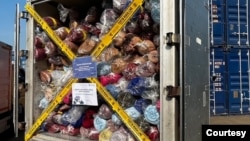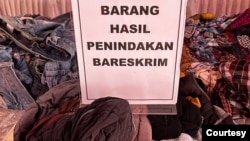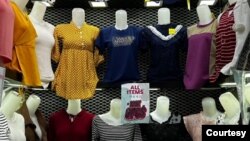Cell phones, electric pots and pans and car washing machines were among $1.3 million worth of goods destroyed by the Indonesian Trade Ministry in West Java on Monday. Alcoholic beverages with 5% to 20% ethyl alcohol or ethanol content were also destroyed.
The ministry demolished the goods as part of a government crackdown on illegal imports, a key issue experts say is Indonesia’s unpreparedness for the ASEAN-China Free Trade Agreement signed 15 years ago.
Trade Minister Zulkifli Hasan said the cargo did not comply with state regulations, lacked a surveyor’s report, cargo registration number or import approval, exceeded import quotas or failed to meet Indonesian national standards.
This is the third operation conducted by the Ministry of Trade, following operations at Sikarang Customs and Excise Storage Area in West Java and Cengarang Port in Jakarta.
On August 6, the Ministry of Commerce revealed that $2.9 million worth of illegal imports had been found at the Sikarang facility. The Ministry of Commerce confiscated 20,000 textile rolls. The National Police seized 1,883 bags of used clothing, and customs officials seized 3,044 bags of used clothing at Tanjong Priok Port. Also, hundreds of carpets, towels, cosmetics, footwear and more than 6,500 electronic items were seized.
Since its establishment in July, the Anti-Illegal Import Task Force has been investigating illegal import schemes, collecting data and seizing illegal goods.
„Illegal imports not only affect the country in loss of revenue, but also affect small and medium-sized entrepreneurs,” said Wahu Widada, head of the Indonesian National Police’s Criminal Investigation Division.
Mohammad Faisal, executive director of the Center for Economic Reforms, links the current problem to Indonesia’s lack of preparation when it signed the ASEAN-China Free Trade Agreement 15 years ago.
„Indonesia’s domestic industries were not ready to compete with competing products from China in the local market. Back then, Indonesia had the largest domestic market and very low trade barriers. Not only tariff barriers, but also non-tariff barriers were very low. That’s why it was really easy for foreign suppliers to enter the Indonesian market,” Faisal said. .
According to the latest data from the Ministry of Cooperatives and Small and Medium Enterprises (SMEs), about 50% of imported textiles and textile products are not registered. That means the state is losing $399 million in unpaid taxes and excise duties.
In 2022, China exported $3.95 billion worth of textiles to Indonesia but recorded only $2.04 billion worth of Chinese textile imports. Collectively, the financial loss would result in the creation of 67,000 jobs and more than $762 million in gross domestic product. According to the World Bank, Indonesia’s GDP in 2023 will be $1.37 trillion.
Zulkifli said one of the main obstacles to combating illegal imports is the existence of the underground economy. Minister of Cooperatives and SMEs, Teten Masduki, said that nearly 30% to 40% of goods sold in Indonesian markets are involved in the underground economy, so the state does not receive taxes on them.
As a result, Indonesia’s tax rate is lower than that of developed Asian countries such as South Korea, Japan and China, Zulkifli added.
„Imagine if we sent illegally imported goods to South Korea or China. Don’t expect it to happen, it’s impossible. That’s why these countries can become developed countries. If our „home” keeps getting stolen, how can we progress?” he said.
In late June, Zulfkli announced plans to impose steep tariffs of up to 200% on certain products. The plan, which is still under consideration, was initially announced as an import tax on Chinese goods, but would later be imposed on all countries, the minister said.
Indonesia’s Shopping Center Retail and Tenants Association has found shops suspected of selling illegally imported goods online across North Sumatra to East Java, and some have opened stores in wholesale centers in Jakarta.
„These Chinese entrepreneurs used to store their products in local warehouses and sell online. But now many have started selling in stores, including international trade centers,” said association president Budihartjo Iduansja.
When VOA visited shops suspected of selling goods illegally imported from China, they found clothes with labels written in Mandarin for $1 each. A salesperson there admitted that she and several other sellers sold their products online and shipped clothes in bulk to resellers across the country.
Zulkifli says investigations by his task force have led to the departure of many foreign nationals suspected of involvement in illegal imports.
He plans to work with universities to study the root causes of illegal imports. He expressed hope that the crackdown on illegal imports would continue under President-elect Prabowo Subianto, who takes office in October.

„Oddany rozwiązywacz problemów. Przyjazny hipsterom praktykant bekonu. Miłośnik kawy. Nieuleczalny introwertyk. Student.



